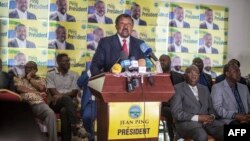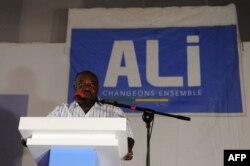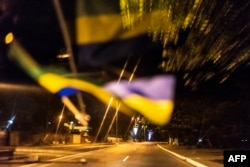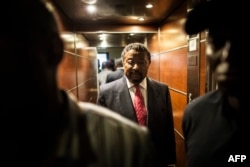The Gabon government accused President Ali Bongo's challenger Jean Ping on Tuesday of trying to destabilize the country, and warned French ruling party officials against "interference" in its affairs.
With both sides trading accusations of fraud after a bitter election campaign, there was concern the results, when they came, would trigger unrest. People stockpiled food, police manned major crossroads and soldiers were deployed at petrol stations and banks.
Ping, a former foreign minister, African Union Commission chairman and lifelong political insider, is the main challenger to Bongo, whose family has ruled the oil-producing central African nation for half a century.
Bongo's supporters say he is on track to win. The president was first elected in 2009 after the death of his father Omar, who ran Gabon for 42 years.
Government spokesman Alain-Claude Nze told a news conference: "Jean Ping seems to be the instigator of a destabilization that threatens the democratic process." His comment appeared to point to government concerns that Ping will announce a results tally independent of the electoral commission that will show him as the winner.
U.N. Secretary General Ban Ki-moon expressed concern about the issuance of premature results and called on Ping and Bongo to urge their supporters to show restraint, according to a U.N. statement, which said Ban had spoken to both men.
Bongo's allies are also furious about a statement from France's ruling Socialist Party on Sunday declaring that early results showed Ping to be the winner.
They accused French officials of carrying on the old politics of 'La Francafrique', an intricate, shadowy web of diplomacy and commerce that for decades kept African presidents in its former colonies, like Bongo's father, in power in exchange for privileged deals for French companies.
"The socialist party by this interference, coming from the same members of La Francafrique, shows once again their inability to understand how African democracies function," Nze said. "The French socialist party is advised to respect our sovereignty."
Authorities have also reacted angrily to an app set up by an Ivorian citizen that allegedly gives live results by region.
Interior Minister Pacôme Moubelet-Boubeya said he would announce results starting on Tuesday evening after a meeting of the electoral commission and warned that any attempts at destabilization by publishing results would not be tolerated.
"Any other so-called results released before, during or after the official declaration are nothing but a lie and a violation of the law," said Moubelet-Boubeya.
"The election has passed satisfactorily and it is unacceptable that anti-democratic forces both inside and outside the country are looking for ways to provoke trouble in Gabon," he said in a statement.
Fears of Unrest
The French embassy advised its citizens to stay indoors after 2 p.m. and to stick to safety precautions.
"There will be trouble and Ali will tackle the problem with his men ... We're afraid of the spillover," said Jadi Mabende, 57, a civil servant at a shop in the capital Libreville.
Gabon's first-past-the-post system means the winner only needs more votes than any other candidate. In 2009, Bongo won with 41.73 percent.
The European Union's observer mission on Monday criticized a "lack of transparency" among the institutions running the polls and said Bongo had benefited from preferential access to money and the media.
Ping's supporters called on the electoral commission to publish the results polling station by polling station. But the head of the electoral commission, René Aboghe Ella, rejected this, telling Radio France International that "this cannot be done today ... to do so would excessively delay the publication of the results."
Earlier, Nze said: "We've noted that the mission overstepped its mandate. This mission was looking into things that had nothing to do with this election."
Bongo, 57, also benefited from being the incumbent in a country with a patronage system lubricated by oil largesse.
But oil output and prices have fallen, forcing budget cuts despite Gabon having one of the biggest revenue streams of all Africa's oil producers.
Gabon's economic troubles have provided fodder for opposition claims that its 1.8 million inhabitants have struggled under his leadership, and Bongo's ruling party has suffered a series of high-profile defections.








